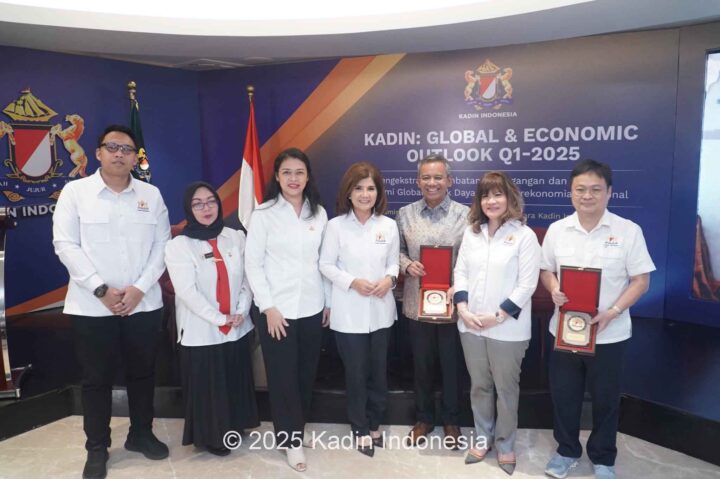
Jakarta – The Indonesian Chamber of Commerce and Industry (Kadin Indonesia) held a forum titled “Global & Economic Outlook Q1–2025: Extracting Trade Barriers and Global Economic Turbulence to Strengthen National Economic Resilience” at the KADIN Indonesia Tower in South Jakarta on Thursday, June 12, 2025.
The discussion was attended by Shinta Widjaja Kamdani, Vice Chair Coordinator for Human Development, Culture, and Sustainable Development of KADIN Indonesia; Aviliani, Vice Chair for Macro-Micro Economic Policy Analysis of Kadin Indonesia; and Suahasil Nazara, Vice Minister of Finance of the Republic of Indonesia.
Representing Kadin Chairman Anindya Novyan Bakrie, Shinta Widjaja Kamdani emphasized the urgent need for domestic policy reforms to address potential economic slowdown, especially in areas related to productivity and incentives.
“One of the main recommendations we are advocating for is increasing economic productivity,” she said.
She noted that the high number of public holidays has contributed to lower productivity in the second quarter.
“We need to recalculate the number of effective working days, as this has a significant impact,” Shinta remarked.
She further proposed that social assistance (bansos) programs be gradually transformed into social entrepreneurship initiatives to foster greater self-reliance and productivity within communities.
“Social entrepreneurship programs encourage people to become more productive by providing the tools, not just the handouts,” she stressed.
Kadin also highlighted Indonesia’s low entrepreneurship rate, which currently stands at just 3.47%.
“This figure remains far below the 10–12% benchmark seen in developed countries,” said Shinta.
She also called for improvements in the country’s Incremental Capital Output Ratio (ICOR), which remains above 6%, significantly higher than the ASEAN average of 3–4%.
Meanwhile, Aviliani, Vice Chair for Macro-Micro Economic Policy Analysis at Kadin Indonesia, highlighted the limited impact of fiscal policy on the business sector.
“Entrepreneurs are observing that the budget reallocations have little effect on businesses,” said Aviliani, commonly known as Avi.
She emphasized the need for a clear focus in government spending to create a multiplier effect that stimulates economic growth.
“When spending lacks focus, it weakens the economic multiplier effect for entrepreneurs and the business sector,” Avi explained.
In his remarks, Vice Minister of Finance Suahasil Nazara underscored the importance of maintaining a long-term strategic focus amid ongoing global uncertainties.
According to Suahasil, the current global landscape is marked by weakening multilateralism and the rise of unilateral policies among various countries.
This situation, he noted, has driven many nations and business players to adopt short-term decision-making approaches.
“If we follow this global trend of short-termism, we will not move forward,” said Suahasil.
He called on all business stakeholders to strengthen collaboration and intensify the use of domestically produced goods.
“Only through such efforts can we multiply the national economic multiplier effect,” he concluded.
National Economy
Regional Economy
National Economy
Regional Economy